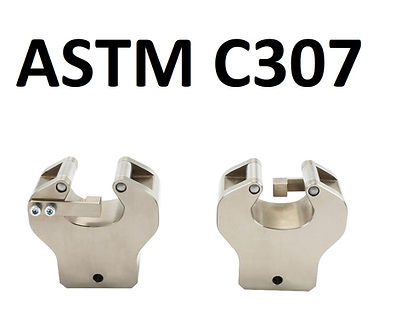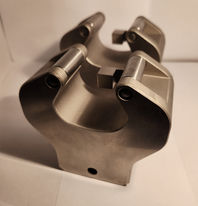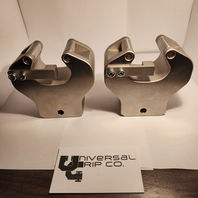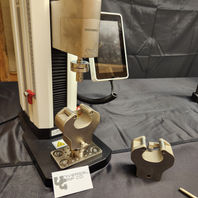ASTM C307
Briquette Tensile Testing Fixture


Standard Test Method for Tensile Strength of Chemical-Resistant Mortar, Grouts, and Monolithic Surfacings - PDF
How to Perform the Test, Fixtures Required, and Key Setup Considerations
ASTM C307 is the standard test method used to determine the tensile strength of chemical-resistant mortars, grouts, and monolithic surfacing materials. This method is primarily used in the construction and chemical processing industries to assess how well these materials can withstand tensile loads without cracking or failing.
The test is critical for evaluating the structural integrity of lining systems, coatings, and grouts used in high-corrosion environments like wastewater treatment plants, chemical containment areas, and food processing floors.
What is ASTM C307 Measuring?
ASTM C307 measures tensile strength, which is the maximum stress a material can withstand while being stretched or pulled before breaking.
This test gives insight into how well mortars and coatings will perform in real-world applications where thermal expansion, structural movement, or mechanical loads apply tension to the system.
Specimen Geometry
The standard specimen is a dog-bone shaped tensile bar with the following dimensions:
-
Length: 76 mm (3 in)
-
Width (at narrowest point): 25 mm (1 in)
-
Thickness: 13 mm (0.5 in)
Test bars are typically cast in a molded shape, using either steel or silicone molds lined with a release agent.
Test Fixtures and Equipment
1. Gripping Fixtures
ASTM C307 requires a tensile test fixture that can securely hold the dog-bone specimen at both ends without slippage or stress concentrations at the grips.
Common setups include:
-
Serrated wedge grips
-
Pneumatic grips with custom jaw faces
-
Threaded end caps (when molded into the specimen ends)
Tip: Due to the brittle nature of the specimens, care must be taken not to overtighten grips and induce cracking before loading.
2. Universal Testing Machine (UTM)
-
Minimum capacity: 5 kN to 10 kN (depending on sample formulation)
-
Must include a load cell with appropriate resolution
-
Capable of applying a controlled crosshead speed of 1.3 mm/min ± 0.13 mm/min
Test Procedure
-
Specimen Preparation
Mix and cure mortar or grout per manufacturer or project specifications.
Cast into standard molds and cure under controlled conditions (e.g., 7 days at 23°C ± 2°C, 50% RH). -
Conditioning
After curing, condition specimens at room temperature (23°C ± 2°C) for 40 hours before testing. -
Measurement
Measure cross-sectional dimensions of the narrowest section.
Mount the specimen in the grips of the UTM. -
Testing
Apply load at a constant crosshead speed of 1.3 mm/min.
Record the maximum load at failure.
Calculate tensile strength using the formula:Tensile Strength (psi) = Maximum Load (lbf) / Cross-sectional Area (in²)
Common Failure Modes
-
Adhesive Failure: Failure at the bond line between mortar and aggregate
-
Cohesive Failure: Cracking or splitting within the mortar material itself
-
Grip Failure: Breaking at or near the grip faces—indicates possible test error
A clean cohesive failure in the gauge section is the desired outcome for a valid test.
Why ASTM C307 Matters
Manufacturers and project engineers use ASTM C307 to:
-
Qualify chemical-resistant flooring and wall coatings
-
Ensure consistency in mortar and grout production
-
Meet third-party certification or compliance standards
-
Predict long-term behavior in aggressive environments
Summary Table
ParameterASTM C307 Requirement
Specimen ShapeDog-bone, 3" length × 1" width × 0.5" thick
Grip TypeSerrated or custom grips for brittle samples
Crosshead Speed1.3 mm/min ± 0.13 mm/min
Test MachineUniversal Testing Machine, 5–10 kN min.
Reported PropertyMaximum Tensile Strength (psi or MPa)
Need Custom Fixtures?
We manufacture custom tensile fixtures specifically for ASTM C307 samples. If you're testing epoxy grouts, vinyl ester mortars, or polymer-modified surfacings, we can provide a turnkey setup that includes:
-
Tensile test fixtures
-
Silicone or aluminum dog-bone molds
-
Compatible load cells and adapters for universal testing machines







